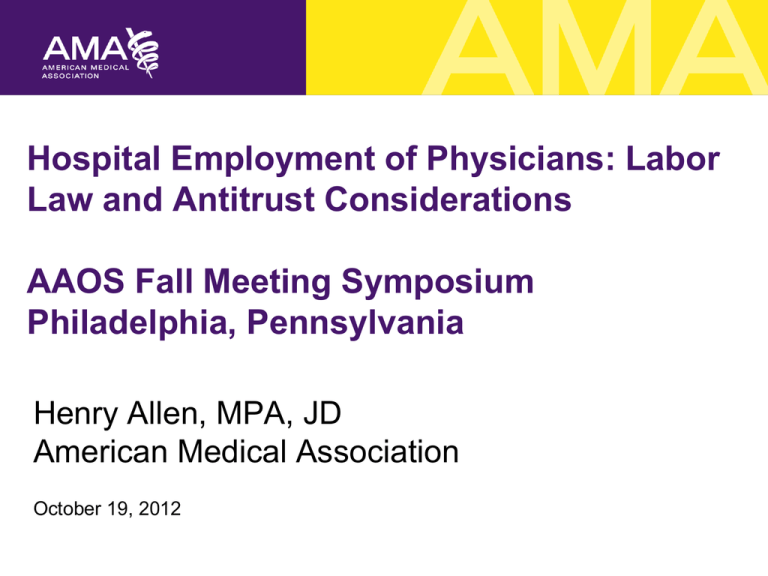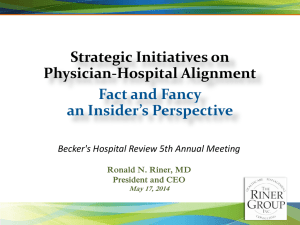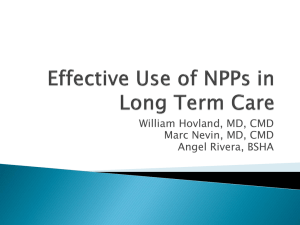
Hospital Employment of Physicians: Labor
Law and Antitrust Considerations
AAOS Fall Meeting Symposium
Philadelphia, Pennsylvania
Henry Allen, MPA, JD
American Medical Association
October 19, 2012
AMA's Competition in Health Insurance: A
Comprehensive Study of U.S. Markets
2011 Update
Summary of Findings
Market concentration (HHI)
In terms of market concentration (HHI), AMA
found the following:
• Eighty-three percent (305) of the combined
HMO+PPO markets are highly concentrated
(HHI>2,500).
2
© 2012 American Medical Association. All rights reserved.
AMA's Competition in Health Insurance: A
Comprehensive Study of U.S. Markets
2011 Update
Summary of Findings
Market share
In terms of market shares, AMA found the following:
HMO+PPO product market
• In 95 percent (348) of the MSAs, at least one insurer had a
combined HMO+PPO market share of 30 percent or greater.
• In 47 percent (174) of the MSAs, at least one insurer had a
combined HMO+PPO market share of 50 percent or greater.
• In 11 percent (39) of the MSAs, one insurer had a combined
HMO+PPO market share of 70 percent or greater.
3
© 2012 American Medical Association. All rights reserved.
Blocking Health Insurer Mergers
DOJ blocked a proposed merger between Blue
Cross Blue Shield of Michigan and
Physicians Health Plan of Mid-Michigan.
The DOJ stated that the acquisition “would
have given Blue Cross-Michigan the ability to
control physician reimbursement rates in a
manner that could harm the quality of
health care delivered to consumers.” (2010)
4
© 2012 American Medical Association. All rights reserved.
Price Fixing - A Per Se Violation of
Antitrust Law
Doctors typically practice in small firms. Where these
firms practice in the same or related specialty and
are in the same geographic market, they are
competitors. They must not jointly negotiate fees
with health insurers unless they are integrated in
ways that promise efficiencies and enhanced
consumer welfare. Arizona v. Maricopa County
Medical Soc., 457 U.S. 332 (1982)
5
© 2012 American Medical Association. All rights reserved.
Physician “Clinical Integration” Costs
Associated With Antitrust Compliance May
Be Contributing to the Trend of Physician
Hospital Employment
Presently, the FTC antitrust guidance on clinical
integration requires resources that many physicians
do not have but that hospitals do possess. Thus,
FTC’s antitrust enforcement policy has the
unintended consequence of encouraging and
facilitating hospital acquisitions of physician practices
and a consolidation of physician markets.
6
© 2012 American Medical Association. All rights reserved.
Statutory Labor Exemption to
Antitrust Law
The Clayton and Norris-LaGuardia acts declare that
labor organizations are not combinations or
conspiracies in restraint of trade. These federal
statutes also exempt specific union activities,
including boycotts, from the operation of the antitrust
laws.
Employed doctors may seek recognition as a formal
union in part because it provides an exemption from
the application of antitrust restrictions on concerted
action.
7
© 2012 American Medical Association. All rights reserved.
Is the Health Insurer/Physician Relationship One
of Employment Such That Concerted Activity Is
Protected By the National Labor Relations Act
(NLRA) and Entitled to the Antitrust Labor
Exemption?
In AmeriHealth HMO 329 N.L.R.B. 870 (1999), the
National Labor Relations Board concluded that
physicians under contract with AmeriHealth HMO
were independent contractors. They were not
employees entitled to the protections of the NLRA.
Hence, doctors jointly contracting with AmeriHealth
HMO may run afoul of antitrust restrictions on
collusive behavior.
8
© 2012 American Medical Association. All rights reserved.
Is the Health Insurer/Physician Relationship
One of Employment? (cont.)
In AmeriHealth, the National Labor Relations Board
pointed out that in denying the union’s petition
seeking to represent all primary care and specialty
physicians contracting with AmeriHealth HMO, it was
not necessarily precluding a finding that physicians
under contract to health maintenance organizations
may, in other circumstances, be found to be statutory
employees.
9
© 2012 American Medical Association. All rights reserved.
HMO and Hospital Employed Physicians
Have Been Found Entitled to National
Labor Relations Act Protection
The NLRB has certified physician unions in
HMOs that employ rather than contract with
doctors. The board has also certified
physician unions in hospitals that employ
physicians.
10
© 2012 American Medical Association. All rights reserved.
Must Hospital Employed Physicians Join a
Union to be Protected by the National Labor
Relations Act?
Answer: NO! The NLRA protects non-union as
well as union employees in any concerted
activity relating to the terms and conditions of
employment. See e.g. New York University
Medical Center and Association of Staff
Psychiatrists, Bellevue Psychiatric Hospital
324 N.L.R.B. No. 139 (1997). (NLRA
prohibited hospital retaliation against employed
physicians engaging in concerted activities).
11
© 2012 American Medical Association. All rights reserved.
Hospitals Acquiring Market Power In
Facility and Physician Markets
In some markets, hospital acquisitions of
physician practices have led to significant hospital
market power over both facility and physician
markets.
Because each physician practice acquisition is
typically small, this development is occurring
largely under the radar of antitrust enforcement.
12
© 2012 American Medical Association. All rights reserved.
FTC Antitrust Enforcement Against
Hospitals Acquiring Physician Practices
“The Federal Trade Commission, which has
filed several recent suits to block hospital
acquisitions, is also closely watching hospitals’
purchases of doctor groups, and mergers that
combine physician practices, Richard Feinstein,
Director of the FTC’s Bureau of Competition,
said.” Wall Street Journal, Sept. 14, 2012
13
© 2012 American Medical Association. All rights reserved.
In the Matter of Renown Health,
Federal Trade Commission (2012)
Renown Health is based in Reno, Nevada,
and operates general acute care hospitals
and commercial health plans which serve
the Reno area. It is the largest provider of
acute care hospital services in northern
Nevada.
14
© 2012 American Medical Association. All rights reserved.
In the Matter of Renown Health, (cont.)
As a result of the acquisitions of two
cardiology groups (and the employment of the
physicians affiliated with those groups),
Renown Health now employs approximately
88% of the physicians providing cardiology
services for adults in the Reno area.
15
© 2012 American Medical Association. All rights reserved.
Alleged Anticompetitive Effects in
Renown Health
According to FTC, the consolidation of the
competing practices into a single cardiology
group controlled by Renown Health led to the
elimination of competition based on price,
quality, and other terms. In addition, the
consolidation increased the bargaining power
that Renown Health has with insurers.
16
© 2012 American Medical Association. All rights reserved.
Remedy In Renown Health
Renown Health has agreed to an order
temporarily suspending the non-compete
provisions currently in place with its cardiologists.
During this time, the cardiologists now working
for Renown Health will be able to seek other
employment, including positions with other
hospitals in the Reno area.
17
© 2012 American Medical Association. All rights reserved.
FTC Blocks Hospital System From
Acquiring Two Cardiology Practices in
Spokane
Federal Trade Commission has blocked
Providence Health & Services from acquiring
Spokane Cardiology and Heart Clinics
Northwest in Spokane, Washington (2010).
18
© 2012 American Medical Association. All rights reserved.
Reported FTC Investigation of St.
Luke’s in Boise, Idaho
The FTC and the Idaho attorney general are
reportedly investigating Boise-based St. Luke’s
System’s proposed acquisition of Saltzer Medical
Group.
19
© 2012 American Medical Association. All rights reserved.
Is St. Luke’s Proposed Acquisition of
Saltzer Medical Group Anticompetitive:
Does it foreclose the market for physician
services?
“St. Luke’s CEO, Pate says St. Luke’s recruits highdemand specialists from other states but doesn’t
usually recruit doctors locally. It does respond to
invitations to buy physician practices, he said. That
helps keep doctors in Idaho who have similar beliefs
in the way health care should be done, he said."
Idaho Statesman, Sept. 16, 2012
20
© 2012 American Medical Association. All rights reserved.
Is the Physician Service Market
National?
“There's a physician shortage around this country.
St. Luke’s Pate said. These physicians can find
jobs in other states where they will give them
income protection and that kind of stuff with no
problem at all. They can go anywhere they want,
basically.” Idaho Statesman, Sept. 16, 2012
21
© 2012 American Medical Association. All rights reserved.
Is Proposed St. Luke’s/Saltzer Merger
Anticompetitive?
There are almost no independent cardiologists
in Boise now, according to state licensing
records. Idaho Statesman, Sept. 16, 2012
22
© 2012 American Medical Association. All rights reserved.
How Do Hospital Mergers That Lead to
Monopoly Injure Consumers?
Hospitals compete for physician referrals, using such
enticements as the quality of its facilities, equipment,
and support services. Hospital mergers leading to
market power reduces hospital incentive to compete on
these factors, allowing the merged hospitals to provide
lower-quality care. See Vogt WB, Town R and Williams
CH “How Has Hospital Consolidation Affected the Price
and Quality of Hospital Care?:, The Synthesis Project,
Issue 9, (February 2006).
23
© 2012 American Medical Association. All rights reserved.
Hospital Mergers May Lead to
Monopsony Power In Physician Markets
Where hospitals compete, a physician
considering hospital employment may weigh
alternative offers and negotiate an competitive
employment agreement.
24
© 2012 American Medical Association. All rights reserved.
Hospital Mergers May Lead To
Monopsony Power In Physician Markets
(cont.)
Once a hospital is allowed to acquire monopsony
power through an unchallenged anticompetitive
merger, employed physicians have no bargaining
power and the antitrust laws offer no post-merger
remedy. (The AMA has had much experience dealing
with the analogous health insurer monopsony power
that the DOJ now recognizes as harmful to the
quality and quantity of physician service.)
25
© 2012 American Medical Association. All rights reserved.
Hospital Monopoly Injures Physician
Facilities
Anticompetitive mergers of hospitals adversely
affect the markets for facility services. Physicianowned facilities---cancer, ambulatory surgery and
imaging centers, as well as specialty hospitals--may be particularly vulnerable because they are
generally small and offer less than a full range of
hospital services. They therefore need the
protection of the antitrust laws.
26
© 2012 American Medical Association. All rights reserved.
27
© 2012 American Medical Association. All rights reserved.





